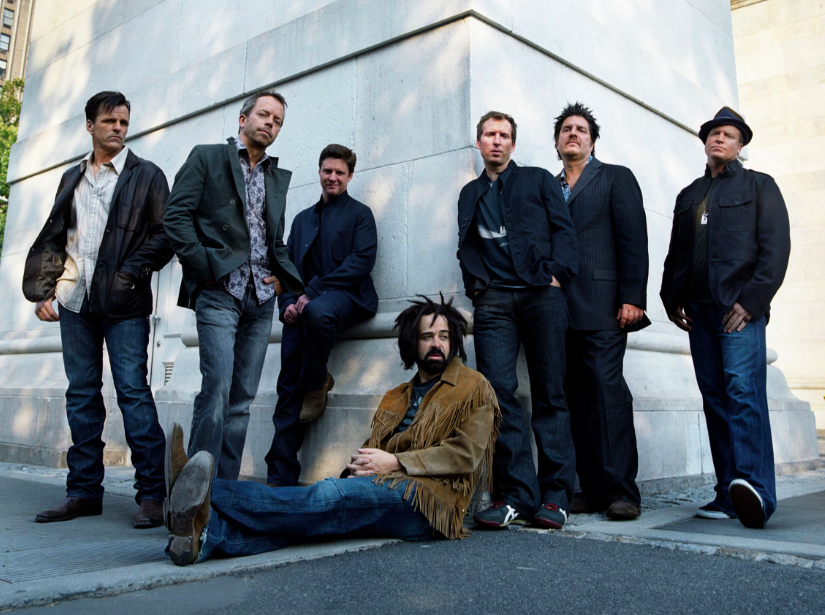
Counting Crows singer Adam Duritz may have born in Baltimore, but he doesn’t seem to have much feeling for the city or its music scene. During a recent talk, Duritz downplayed the connection, though he said he’s looking forward to playing tomorrow’s Black-Eyed Susan concert at Pimlico. It’s a daylong event, featuring a full slate of racing and live music with Annie Bosko (4 pm), The Fray (5:30 pm), and the Crows (7:30 pm). Tickets start at $7.
So the Black-Eyed Susan Day show will be something of a homecoming for you?
I guess. My dad used to live in an apartment building behind Pimlico, but we moved away when I was really young, so I don’t have many memories of Baltimore. I’d go back during the summer to visit family, but that’s about it. My little sister still lives there, outside D.C., and she’ll be at the show. I’m always happy to see my sister.
Any thoughts on the Baltimore music scene?
I don’t really know anything about the Baltimore music scene. Again, I was really young when I moved away.
I know, but I was wondering if you had any thoughts about the music that’s been coming out of Baltimore over the past couple of years. Folks like Beach House, Dan Deacon, Future Islands…
Future Islands are from Baltimore?
Sure, they live here. You’re familiar with them?
Not really. I saw them on Letterman. I don’t really know anything about Baltimore’s music scene.
I haven’t heard it yet, but I know Counting Crows have a new album in the works. What can you tell me about it?
After our tour last summer, we got together in New York, wrote songs, and did some recording. We mixed in April, and it will be out in September. The songs are different lyrically, and I feel like they’re a step forward, for me, as a writer. There’s less first person, though they still feel personal. They have more imaginative range, and they sound more like how we play live—they’re more adventurous. The first song, “Palisades Park,” is eight-and-a-half minutes long and has several movements to it. Overall, these songs may be a little stranger than our older material.
You’ve talked about struggling with mental illness. Are they related to that?
It’s hard to say. I have sort of a disassociative disorder that can make things distant and hard to relate to.
Does touring help with that, or make it worse?
It used to be bad, but it’s gotten better. When we’re touring, I know where I’m supposed to be, and that sort of focus helps. The focused part of touring is definitely a good thing. It’s better than being at home. It’s hard for me to be home alone with nothing to do.
It probably helps to be around longtime friends and bandmates.
Some of us have been playing together for 27 years, so it’s probably more like siblings, more like brothers and sisters. It’s friendly, but not like best friends. After all, we’re working—it’s a job.
Besides Counting Crows, I know you’ve championed a bunch of indie bands, including, back in the day, one of my favorites, The Gigolo Aunts.
Oh, yeah. They were great. You know Dave [Gibbs] and I made a movie together. It’s called Freeloaders, and he wrote the screenplay. He’s living in L.A. now, and I think he’s opening a wine bar. I always liked that band. And I’ve been putting on these indie showcases at CMJ for the past couple of years, because there’s a lot of really good music being made right now. The industry is still going through a strange time. It’s probably harder for bands to make a million bucks, but it’s easier for them to get their music out there and survive.
Who are some of your favorite bands?
Field Report is a great band from Milwaukee, and Phox and Foreign Fields are also groups from Wisconsin that I like a lot. In Boston, there’s Mean Creek. Somebody’s always putting out a new album, and it’s a fun time to be a music fan.
At this point in your career, you’ve been in a hugely successful band, written hit songs, toured the world, started an indie label, and even produced a movie. What would you like to do next?
I’ve been working on a play, and I’d really like to finish that. I’ve been so busy and so is my partner on this, [Stephen Belber], who does a lot of Broadway and off-Broadway plays. It’s called Black Sun, and it’s about what happens when the sun changes and goes black. At first, people don’t know what to do, and eventually they have to confront a lot of different things. It’s kind of strange, but I think people will find it interesting.